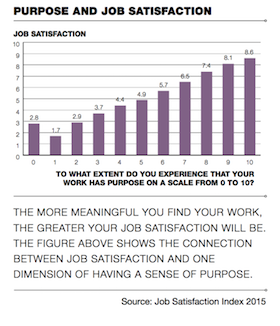Compare courses from top Australian unis, TAFEs and other training organisations.
8 Career Defining Moves to Make in Your 40s
Smash it in the ‘rush hour of life’ with these 8 career goals to tick off in your 40s!
Vivien Luu
Jul 14,2016
Your forties are downright hectic.
Whether you’re wrestling your toddler into the car seat, or on yet another red eye flight to get back home in time for your anniversary dinner, you still have to somehow find the time to check in on your steadily ageing parents, throw together a presentation for Friday’s meeting, shoot off a dozen emails, and (hopefully) squeeze in a quick gym sesh.
Yep, welcome to your forties – the ‘rush hour of life’ as economist Lans Bovenberg describes it.
The Rush Hour Of Life
Bovenberg points out that as many professionals delay having children until their mid-thirties in order to focus on their careers, it’s inevitable that you’ll reach the top of the career game in your forties, just as you’re knee-deep in nappies.
And even if you don’t have any kids, in your 40s you’ll have a lot more responsibilities (in work and life in general), and far fewer excuses to shirk them.
To further complicate your midlife, science says that irrespective of whether or not we have children, we’re biologically hardwired to be the least happy in – you guessed it – our forties.
The U-Curve
Studies that have mapped happiness over the course of the human lifespan consistently identify a U-curve effect, where happiness peaks at the beginning and end of life, but takes a serious nosedive around our middle years.
‘Human happiness hits the lowest point around the ages of 40 to 42,’ writes Melbourne University researcher Dr Terence Cheng, who led a longitudinal study into the U-bend phenomenon. ‘The jury’s now in. People really do experience midlife crises.’
Half-Time!
So why do midlife crises occur? Because hitting that big 4-0 is like a screeching halftime siren. It unapologetically wails down on you, wakes you up, and makes you think – ‘Oh my god, is this it? I’m halfway through my life and my career, and I haven’t done anything!’
Maybe you’re one of the lucky few who’s managed to accomplish everything you wanted, but for the majority of fortysomethings, a mid-career crisis is a very real possibility.
Stuck In The Middle
A Gallup poll found that half of Baby Boomers and Gen X employees were not engaged by their work. Jim Harter, Gallup’s chief scientist for workplace management and wellbeing, told The Atlantic that those in midlife were more likely to complain of feeling ‘locked into’ their careers; and that the trend of a mid-career slump was evident across all industries and all income levels.
Harter also noted that university-educated employees tended to report greater unhappiness levels than those who only graduated from high school. He believes that this could be explained by the fact that those with higher educations had higher expectations for themselves, and therefore found career disappointments all the more demoralising.
Career Expectations vs. Career Reality
It’s in your 40s that you really start to re-evaluate your life’s accomplishments, and begin to see the potentially stark difference between the career you aspired to have, and the one you actually have.
Economist Hannes Schwandt attributes the midlife slump to this profound sense of dashed expectations. He found that young people had a tendency to overestimate how bright their futures would be, while older respondents were more pessimistic. Those in the middle experienced a terrible double whammy: feeling both dissatisfied with life and pessimistic about their future.
Schwandt’s work confirms that ‘the U-shape in life satisfaction is driven by unmet aspirations that are painfully felt during midlife.’
So what can you do about it? According to the research, quite a lot! Here are eight career moves you can make to help you get ahead (literally) of the curve!
1. If You’re Not Happy With Your Job, Make A Change
Easier said than done, right? Of course it won’t be easy.
But is it possible? Hell yes.
This can apply to any decade of your career really, but it’s even more important if you’re a fortysomething who’s starting to feel that midlife anxiety sweep through your soul.
How radical does the change need to be? That’s completely up to you.
The main thing is to pinpoint why you’re feeling so disgruntled, and to start from there.
If you’re watching your baby-faced millennial colleagues zip past you while you slog it out on the same rung of the career ladder, lay down the gauntlet. Go formalise your years of experience with a qualification, or specialise and push yourself into a new niche.
Or perhaps you’re returning to work after taking a career hiatus in the name of child-rearing, and you’re feeling intimidated by the prospect of job-hunting as an older worker. Arm yourself with ‘must-have’ skills for the future, and look for companies that offer returnships – internships for experienced employees returning to the workforce.
Or maybe you’re downright miserable at work and want to completely change things up. Well then do it already! Lean into the unknown and change your career.
The main thing is: if you’re unhappy, make a change.
The future of our workforce is changing, and as our working lives increase, it means that by the time you’re in your 40s, you’ve got another 20 or possibly even 30 years ahead of you.
So if you’re not happy in your career, now is the time to do something about it.
2. Be Driven By A Sense Of Purpose
What if you know that you need to make a change, but you have no idea what that change should be?
There’s no one way to figure this out, but a recent study conducted by Copenhagen’s Happiness Research Institute might hold the key to understanding what makes for a ‘happier’ career.
The think tank surveyed 2,600 Danish workers to understand the source of professional contentment, and found that irrespective of sector or job title, what contributed most to a worker’s happiness was a sense of purpose in their work.
The need to find a deeper purpose seems to become more pronounced as we reach middle age. Phillip A. Pizzo, director of the Distinguished Careers Institute, a program that connects middle-aged individuals with meaningful work, says ‘when people get to their mid-career phase, they want to give back and do something meaningful.’
So ask yourself, what is it that drives you? What things fire you up, and how do you want to contribute to world? These questions will help you find your career sweet spot.
3. Do That Thing You’ve Always Wanted To Do
Whatever it is that you’ve dreamed of doing, do it.
Whether it’s starting a meaningful career as a nurse, realising your dreams of being an author, or finally turning that crazy business idea into a fully-fledged start-up – it’s now or never.
The good news is that science is on your side.
A US study has tracked the intellectual ability of individuals over their lifetime, finding that respondents in their midlife scored higher on almost every measure of cognitive functioning than they did when they were 25. Reasoning and verbal memory, spatial reasoning, numerical ability and verbal ability are vastly improved by midlife.
And don’t let the Mark Zuckerbergs of the world fool you – being older isn’t a disadvantage. It can actually be your competitive edge.
The average age at which an entrepreneur launches a startup is 40, and a study by the Kauffman Foundation found that people over 55 are twice as likely as people under 35 to launch a high-growth startup.
So there you have it! Age shouldn’t be an excuse. Whatever it is you’ve always dreamt of doing, go do it.
4. Think Big Picture
Before you go completely rogue, run off to Silicon Valley and demand that every angel investor give your company all the money in the world – you need to have a plan.
Your forties are usually when you start to give your superannuation or retirement any proper thought; so any earth-shattering career changes need to be considered in light of ‘the bigger picture’.
How will this affect your ability to pay bills? How will you provide for your children and/or elderly parents? What does this mean for your retirement? All these things need to be considered before you get stuck in.
But they shouldn’t hold you back either. They’re a challenge, not an obstacle.
You just need to be deliberate, and think deeply about what you might need to sacrifice, and weigh it up against the cost of not taking action.
According to palliative care nurse, Bronnie Ware, ‘I wish I’d had the courage to live a life true to myself, not the life others expected of me’ was the number one regret most commonly voiced by her patients.
In your forties, you have the opportunity to execute this change with the wisdom and precision your 20something self would never have been capable of doing. So take stock of where you are now, and map out where you’d like your career to be.
5. Get Your Career Story Straight
Whatever your next move is going to be, make sure it’s consistent with your career narrative.
Your career narrative tells the story of your working life – it highlights and articulates your career aspirations, what you’re passionate about, and where you want to go next.
Whether you’re pivoting into a new field or looking to completely revamp your career, it’s important to consider how this change fits into your story as a whole.
Perhaps you’ve recently discovered a passion for cycling, and have applied for a job with SBS Cycling Central in order to combine your marketing skills with your love for the sport. Maybe you’re an outdoorsy person who wants to help people, and that’s why you’re applying to work as a firefighter.
Whatever the change might be, make sure your career story is cohesive and shows clarity about what you want out of a job. A disjointed narrative might send the wrong message and imply that your career choices have been haphazard or random, rather than something deliberate and well thought out.
6. Own Up To Your Limitations, Play To Your Strengths
By your 40s you know exactly who you are. You’re comfortable in your own skin, you know what you’re good at, and what you’re not.
Your 20s and 30s were the time to work on your weaknesses. But if you haven’t conquered them by now, you’re probably not going to master them anytime soon. So instead of dwelling on your shortcomings, focus on what you’re really good at, and play to your strengths!
Be sure to keep on top of industry news, attend specialist events, take every opportunity to learn new skills, and voice your opinions on platforms such as LinkedIn, Twitter, or even TedEX.
By mastering your area of expertise, you can become a thought leader in your field, and develop a distinct personal brand that’s remembered and even revered.
This is how you can become the ‘go-to’ person in your niche, and launch the next phase in your career.
7. Leverage Your Networks
You’ve accumulated two decades worth of industry contacts – tap into them! Your network is an absolute goldmine of potential, giving you access to skills, insights and industry know-how that your twentysomething self could only dream of.
So make sure to nurture your contacts and maintain your professional networks. Used professional platforms such as LinkedIn and lean on the experience of your own handpicked ‘brains trust’.
And network smarter, not harder. In your 40s you simply don’t have the time (or the energy) to turn up to every function, and aimlessly hand out business cards. A robust network is built on quality not quantity.
Your networks could be the foundation of a new career, a new client base or new opportunities.
8. Prioritise Your Time
Striking a true work/life balance is never easy, but in your forties as you’re juggling the career ambitions thing with the family thing, and perhaps the midlife crisis thing as well – work/life balance can feel impossible to achieve.
But that doesn’t have to be the case. You don’t have an indefinite amount of time on your hands, so learn to prioritise what is most important to you and where possible, delegate or outsource the rest.
Embrace the power of the word ‘no’. It’s a powerful word that has the potential for freeing up your time.
Your forties are an incredible opportunity to recalibrate, take stock of what’s really important to you, and to build a meaningful career. You’ve still got a couple of decades left in your working life, so make them count!
Looking to future-proof your career? Find out what 10 skills all employers are looking for in 2020 and beyond.
About the author
Viv is a writer who enjoys researching and writing about creativity, how the human mind works, and neuro processes. She values creativity above all else and admires people who pursue their career dreams, no matter the sacrifice. In her spare time, she binges on HBO shows and epic fantasy novels.










